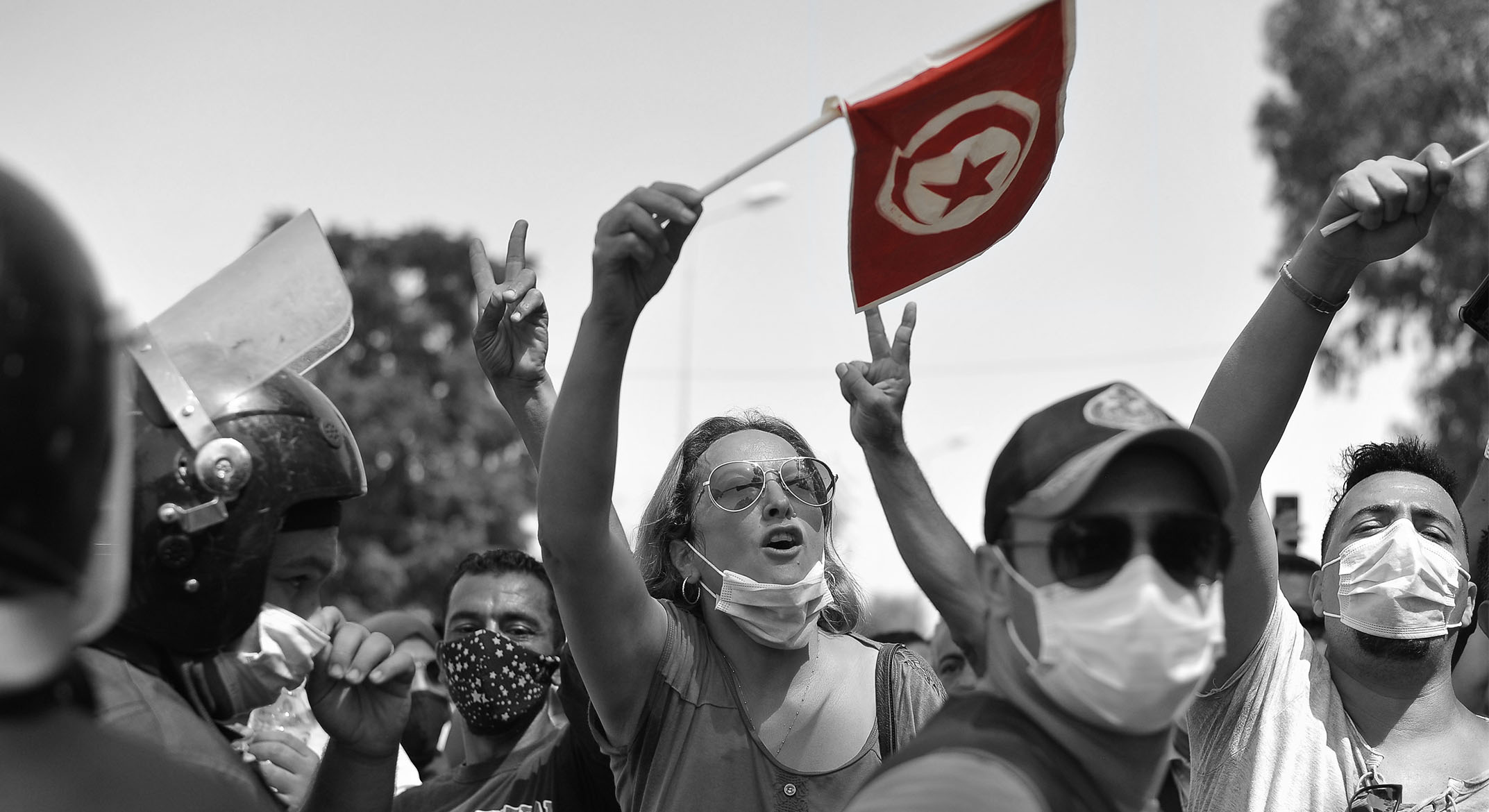
After passing the constitution: Tunisia moves towards the institutionalization of autocracy – Salaheddine El-Jourchi

After passing the constitution: Tunisia moves towards the institutionalization of autocracy – Salaheddine El-Jourchi
The constitutional issue has once again become central in the troubled Tunisian scene. The matter did not remain within the limits of theoretical and political discussion in terms of what could be amended in the 2014 constitution. The various parties, political forces, and civil society actors agreed upon it, after conflicts and debates in which everyone participated, and which the overwhelming majority of the deputies of the National Constituent Assembly voted on. However, President Saied intended to abrogate this constitution as he individually drafted an alternative constitution and called on Tunisians to vote thereon. This took place on July 25, 2022 on the one-year anniversary of the move he made, according to which he froze and dissolved the Parliament later, dismissing the previous government, and placing his hands on all authorities in the country, including the judiciary.
The alternative constitutional referendum result was controversial, with a percentage of 94.6%, a number that reminded Tunisians of similar numbers that were adopted before the revolution. In return, the number of voters did not exceed 30% of those entitled to participate in the referendum, which opened a window for the Opposition to accuse the authority of fraud, and demanded the resignation of the president.
President Kais Saied justified his decision to abrogate the 2014 constitution with several justifications, the most important of which is that it is “against the values and goals of the revolution”, formulated by “the enemies of the people in order to monopolize power and steal its wealth.” He also considered it a “mined” constitution, formulated by Al Nahda and pro-Government parties, while the main and ideological parties and civil society actors experienced strong and open conflicts against political Islam in order to give the constitution a civil and democratic character.
Accordingly, President Saied drafted another constitution that was different in spirit and text, which included the most important characteristics of autocracy whereby he gathered all the authorities, he became in control of its most important joints, and the decision-making authority belonged to him alone. This put the political and civil actors in an unprecedented predicament. Instead of helping to achieve political stability, enhance national unity and protect democratic gains, the exact opposite happened, as the division among Tunisians deepened, and fears escalated among the elites, and concern returned about the possibility that this path would burry the emerging democratic experiment and expose human rights to serious risks.
President Kais Saied believes that discontinuing with the past decade, which he describes with all the awful descriptions, necessarily passes through the development of a new constitution and alternative legislation. He was supported in this "revolutionary" trend, as his opponents describe it, by some Islamic opponent ideologues, such as the various nationalists. Large segments of the public opinion also initially supported him.
The ruling experience revealed that the most important problem that resulted from the implementation of the 2014 Constitution is related to settling a two-headed executive authority, which created conflicts of power between the President of the Republic who is directly elected by the people, and the Prime Minister who is appointed by the party or the winning party alliance in the parliamentary elections. Given the conflicts and alliances that resulted therefrom, which greatly disrupted the wheels of the state, especially in light of a divided and weak parliament; this made all Tunisians anti-parties and anti-parliament. President Saied took advantage of this troubled environment and used it as a justification for the necessity of a constitutional amendment, to establish a strong presidential system to the extent of excessive domination of the State, especially that the majority of Tunisians still give high symbolic importance to the position of the president and the notion of the State.
The president has his opinion and his opponents have theirs
Since President Saied announced the decision to abrogate the previous constitution and establish a new one, he has faced a wide and varied opposition among the political and civil elites such as parties, civil society organizations, unions and academics, including the majority of constitutional law professors. The points of contention can be summarized in two main issues:
First: The opposition parties confirmed that the Head of State does not have the right to cancel the existing constitution by an individual decision. Rather, after the revolution, he needs to abide by the legal, institutional and political controls that the various actors agreed upon at the end of the drafting of the 2014 constitution.
Second: In case the decision to change the constitution is accepted, the various communities demanded the Head of the State to provide the right to participate in the drafting of the alternative, emphasizing in particular on the fact that individuals do not write constitutions. However, they derive significance and become binding on everyone when agreement is reached on their contents, and then they are transformed from a mere written text to an important reference. President Saied initially set conditions according to which, anyone who rejected the July 25 track and considered it a “coup d’état” was excluded. Then he appointed a committee to organize the dialogue with those who agree with him, and assigned as a president, one of the great professors in the field of constitutional law, Mr. Sadiq Belaid. When this committee prepared a draft constitution in difficult and quick circumstances, the Head of State surprised everyone by publishing a different document, which he drafted and published in the Official Gazette. Then he returned to introduce more than forty amendments after exceeding the legal period, which specialists considered before the litigants as a clear violation of the procedures, making the project legally invalid. However, their objections were not heard. He also made the head of the "Advisory Committee for Establishing a New Republic", Sadiq Belaid, publish the text of the draft he submitted to Kais Saied, and to address the president's constitution with harsh criticism, describing it as "dangerous", establishing of a new dictatorship, and granting the Head of State "Pharaonic powers."
A constitution that recognizes some rights and undermines others
President Saied ’s constitution preserved many of the freedoms and rights mentioned in the 2014 Constitution, including the freedom of conscience that he had previously criticized in his speeches and intended to eliminate, same as he restricted the term of the presidency to two terms only. On another hand, he canceled other aspects considered among the major achievements of the Tunisian revolution and considered among the guarantees of the establishment of a democratic system, such as:
• Abolishing the doctrine of separation of powers, as the constitution gave a wide scope for the Head of State to interfere in the government and parliament’s work.
• The constitution granting the Head of State absolute immunity, and making him “shielded’’ from accountability during his exercise of power and even after the end of his official duties.
• Finishing off the principle of the independence of the judiciary, which is no longer an authority, but rather a job.
• Stop quoting the universal reference as being higher than the local law, thereby allowing domestic legislation to be submitted to international human rights instruments.
• Marginalizing the role of parties and civil society organizations, in addition to reducing the Parliament’s powers and restricting its movement through the establishment of the "Council of Regions and Authorities", a second chamber, which was granted wide powers within the framework of the political vision that President Saied, believes in and that is called "the base regulation".
Parties and civil society are facing a difficult situation
Despite the citizens' reluctance on political affairs in general and on participating in the referendum in particular, President Saied is determined to turn the situation upside down. He has not shown willingness - even after the passage of his constitution - to involve the rest of the actors in setting public policies, taking advantage of the prevailing state of division among the elites. He is currently working on developing a new electoral law that guarantees him the support of the Parliament and the authorities, and enables him to remove his opponents through the mechanism of "withdrawing the proxy" from any person who was elected and did not abide by the new rules of the game.
In order to confront this new “curvature” that Tunisia entered, many alliances were established, some of which are related to a party, and others are civil. Although most components of civil society supported what Kais Saied did on July 25, 2021, they gradually modified their position in light of the decisions taken by the president, until many of them found themselves currently in a state of disagreement or confrontation with the current authority. At the forefront of these parties comes the Tunisian General Labor Union, which is still considered a refuge for many parties and associations, or the Tunisian Association of Democratic Women or the Syndicate of Journalists. The post-passage phase of the new constitution is expected to witness a state of high polarization, pending the outcome of events.
Salaheddine El-Jourchi
Recent publications

